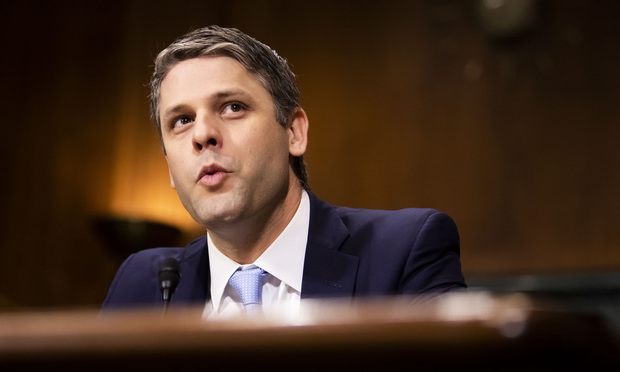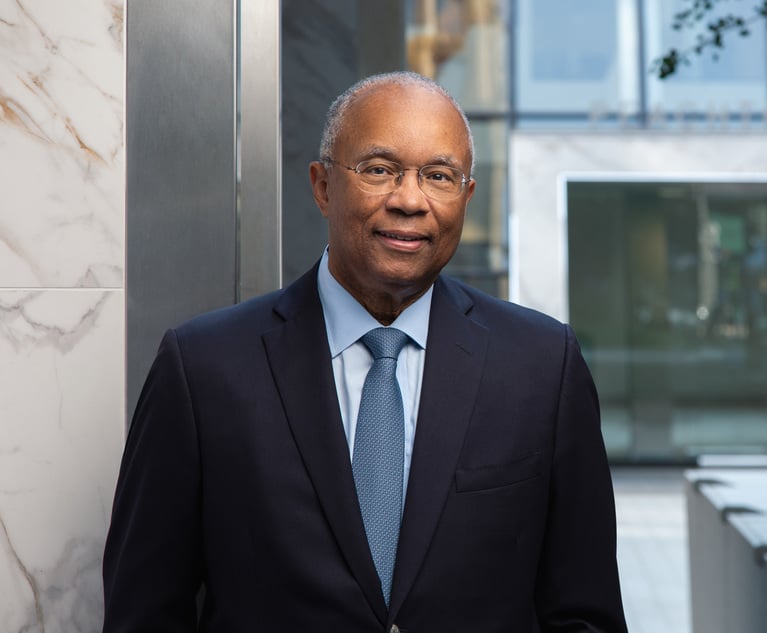Ex-Kavanaugh Clerk Deemed 'Not Qualified' for Bench Defends His Nomination
Former Kavanaugh clerk Justin Walker faced questions at his confirmation hearing for a Kentucky trial court seat over his lack of court experience.
July 31, 2019 at 12:55 PM
5 minute read
 Justin Walker testifies before the Senate Judiciary Committee during his confirmation hearing to be U.S. District Judge for the Western District of Kentucky, on Wednesday. Photo: Diego M. Radzinschi/ALM
Justin Walker testifies before the Senate Judiciary Committee during his confirmation hearing to be U.S. District Judge for the Western District of Kentucky, on Wednesday. Photo: Diego M. Radzinschi/ALM
Justin Walker, who vigorously advocated for the U.S. Supreme Court confirmation of his former boss, Justice Brett Kavanaugh, drew pointed questions Wednesday during a Senate hearing on his own federal court nomination after the American Bar Association deemed him “not qualified” for the bench.
Walker, 37, a litigator at Dinsmore & Shohl who also teaches at Brandeis School of Law at the University of Louisville, was tapped by President Donald Trump for a seat on the U.S. District Court for the Western District of Kentucky. A former clerk to Kavanaugh on the U.S. Court of Appeals for the D.C. Circuit, Walker also clerked for Justice Anthony Kennedy.
“The ABA rated you unqualified because of your experience level. I respect the ABA a lot, but to me it's a question all of us will have to answer. Why are you qualified to be a judge?” Senate Judiciary Chairman Lindsay Graham, R-South Carolina, said at Walker's confirmation hearing.
Walker said his career demonstrated his qualifications in various ways, including: teaching students trial practice, criminal law and evidence. He also pointed to his academic writings—”hundreds of pages”—about criminal procedure and other topics; maintenance of a law practice while being a full-time law professor, and 17 letters from “hundreds of local lawyers” and former students attesting to his open-mindedness.
Over the past two years, Democrats have zeroed in at times on the relative lack of court experience, and age, of some of Trump's judicial candidates. One nominee—who later withdrew—got tripped up trying to answer a question about the definition of a “motion in limine.” A 36-year-old former Williams & Connolly partner, confirmed to the Fourth Circuit, was pressed about her “life experience.”
California Democratic Sen. Dianne Feinstein, the ranking Democrat, on Wednesday homed in on Walker's lack of actual trial and court practice.
“You never served as sole or leading counsel at a trial,” she told Walker. “You appear to have worked on only one criminal case—a recent pro bono matter. Have you worked on any other criminal case?”
Walker said he has worked on “some other criminal matters,” but, he added, “the thrust of my career has been in academia.” Walker reported earning about $95,300 from his Louisville teaching post last year, in addition to receiving an $8,500 honorarium from the Federalist Society.
Feinstein pressed again asking him how many bench trials he had handled. “Have you ever taken a deposition in a federal case?” she asked. Walker said he took one deposition in a state case, adding, “My role has been at times in the courtroom, but more often than not, exploring the law, writing about the law.”
Walker noted that Justices Stephen Breyer and Elena Kagan went to the federal bench without actual trial experience. “I can analyze the kind of complex legal questions judges do,” Walker told the committee. “I would encourage you not to just take my word for it but the word of 200 litigators from my local community that I have the temperament, background and experience.”
Utah Republican Sen. Mike Lee defended Walker's nomination, calling him a “lawyer's lawyer.” Lee said federal district court judges come from different backgrounds, some with trial experience.
“Others come with a lot of writing experience,” Lee said, calling that skill “every bit as important.” In walker, Lee added, “We have someone who will come to the federal district court well prepared to deal with in many ways the most difficult part of the job—dealing with dispositive motions.”
Walker, part of a wave of former Kavanaugh clerks who backed the then-judge's nomination to the Supreme Court last year, made dozens of local and national media appearances on Kavanaugh's behalf.
In an interview with The National Law Journal before Kavanaugh's nomination, Walker tried to dispel any notion that Kavanaugh would disappoint conservatives. “I would bet the farm that Judge Kavanaugh would not go wobbly” on key conservative issues,” Walker said. “He doesn't have a wobbly bone in his body.”
The committee hearing adjourned with the record left open for senators to submit written questions to Walker and other nominees.
Read more:
Ex-Kavanaugh Clerk Justin Walker Gets Trump Nod for Kentucky Court
Nearly 2,000 Female Lawyers Voice Support for Christine Blasey Ford
Democrats Pressed 36-Year-Old Circuit Pick on 'Life Experience'
Federal Court Nominee Flunks 'Motion in Limine' Definition at Senate Hearing
President Trump Is Packing the Courts With Law Firm Partners
Former SCOTUS Clerks Dominate the Ranks of Trump's Judicial Nominees
This content has been archived. It is available through our partners, LexisNexis® and Bloomberg Law.
To view this content, please continue to their sites.
Not a Lexis Subscriber?
Subscribe Now
Not a Bloomberg Law Subscriber?
Subscribe Now
NOT FOR REPRINT
© 2025 ALM Global, LLC, All Rights Reserved. Request academic re-use from www.copyright.com. All other uses, submit a request to [email protected]. For more information visit Asset & Logo Licensing.
You Might Like
View All
Read the Document: DOJ Releases Ex-Special Counsel's Report Explaining Trump Prosecutions
3 minute read
3rd Circuit Nominee Mangi Sees 'No Pathway to Confirmation,' Derides 'Organized Smear Campaign'
4 minute read
Judge Grants Special Counsel's Motion, Dismisses Criminal Case Against Trump Without Prejudice

Ex-Deputy AG Trusts U.S. Legal System To Pull Country Through Times of Duress
7 minute readTrending Stories
Who Got The Work
J. Brugh Lower of Gibbons has entered an appearance for industrial equipment supplier Devco Corporation in a pending trademark infringement lawsuit. The suit, accusing the defendant of selling knock-off Graco products, was filed Dec. 18 in New Jersey District Court by Rivkin Radler on behalf of Graco Inc. and Graco Minnesota. The case, assigned to U.S. District Judge Zahid N. Quraishi, is 3:24-cv-11294, Graco Inc. et al v. Devco Corporation.
Who Got The Work
Rebecca Maller-Stein and Kent A. Yalowitz of Arnold & Porter Kaye Scholer have entered their appearances for Hanaco Venture Capital and its executives, Lior Prosor and David Frankel, in a pending securities lawsuit. The action, filed on Dec. 24 in New York Southern District Court by Zell, Aron & Co. on behalf of Goldeneye Advisors, accuses the defendants of negligently and fraudulently managing the plaintiff's $1 million investment. The case, assigned to U.S. District Judge Vernon S. Broderick, is 1:24-cv-09918, Goldeneye Advisors, LLC v. Hanaco Venture Capital, Ltd. et al.
Who Got The Work
Attorneys from A&O Shearman has stepped in as defense counsel for Toronto-Dominion Bank and other defendants in a pending securities class action. The suit, filed Dec. 11 in New York Southern District Court by Bleichmar Fonti & Auld, accuses the defendants of concealing the bank's 'pervasive' deficiencies in regards to its compliance with the Bank Secrecy Act and the quality of its anti-money laundering controls. The case, assigned to U.S. District Judge Arun Subramanian, is 1:24-cv-09445, Gonzalez v. The Toronto-Dominion Bank et al.
Who Got The Work
Crown Castle International, a Pennsylvania company providing shared communications infrastructure, has turned to Luke D. Wolf of Gordon Rees Scully Mansukhani to fend off a pending breach-of-contract lawsuit. The court action, filed Nov. 25 in Michigan Eastern District Court by Hooper Hathaway PC on behalf of The Town Residences LLC, accuses Crown Castle of failing to transfer approximately $30,000 in utility payments from T-Mobile in breach of a roof-top lease and assignment agreement. The case, assigned to U.S. District Judge Susan K. Declercq, is 2:24-cv-13131, The Town Residences LLC v. T-Mobile US, Inc. et al.
Who Got The Work
Wilfred P. Coronato and Daniel M. Schwartz of McCarter & English have stepped in as defense counsel to Electrolux Home Products Inc. in a pending product liability lawsuit. The court action, filed Nov. 26 in New York Eastern District Court by Poulos Lopiccolo PC and Nagel Rice LLP on behalf of David Stern, alleges that the defendant's refrigerators’ drawers and shelving repeatedly break and fall apart within months after purchase. The case, assigned to U.S. District Judge Joan M. Azrack, is 2:24-cv-08204, Stern v. Electrolux Home Products, Inc.










